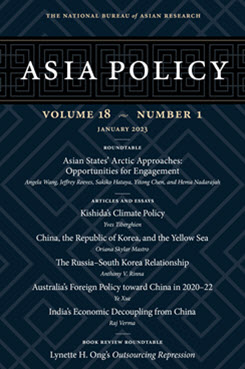Essay in Asia Policy 18.1
Kishida’s Climate Policy and Opportunities for U.S.-Japan Cooperation
This essay summarizes key trends and drivers in Japan’s climate policy, with an emphasis on the acceleration of commitments and policies that has taken place during the Suga and Kishida cabinets, and reviews the policy implications.
Note: This is the fourth in a series of four essays in 2022–23 on “A U.S.-Japan Partnership for a New Era,” made possible by the generous support of the U.S.-Japan Foundation.
EXECUTIVE SUMMARY
MAIN ARGUMENT
Japan’s climate policy development has been dominated by a technocratic policy triangle that includes the Ministry of Economy, Trade and Industry; politicians within the dominant Liberal Democratic Party; and industry. This triangle has generated cautious policymaking characterized by gradualism and a focus on the long-term viability of existing industrial assets. However, the acceleration of climate policy under the Suga and Kishida governments of the last two years has been driven by political leadership in response to both competition in East Asia and overtures from the Biden administration. Most crucially, Japan’s stepped-up commitments include a comprehensive vision of economic and energy security that views the current competition over green technology in the Indo-Pacific as crucial for future economic competitiveness. Under the Green Transformation (GX) strategy, industrial policy is back.
POLICY IMPLICATIONS
- Energy security and industrial competitiveness are driving the new Japanese approach to climate policy. In the context of a tighter geopolitical environment in the Indo-Pacific area, this approach opens more avenues for cooperation with key allies and partners.
- The Kishida cabinet is emphasizing several key policy sectors: solar energy, nuclear energy revival, ammonia and hydrogen innovation in combination with continued clean coal use, and electric vehicles.
- Japan’s climate policy approach will have a strong focus on innovation, competition, and industrial renewal, focusing as much on the supply side as the demand side.
Yves Tiberghien is a Professor of Political Science, the Konwakai Chair in Japanese Research, and the Director of the Center for Japanese Research at the University of British Columbia in Vancouver, Canada. Professor Tiberghien is also a Distinguished Fellow at the Asia Pacific Foundation of Canada and a Visiting Professor at Tokyo University’s Graduate School of Public Policy. He is an International Steering Committee Member at the Pacific Trade and Development Conference (PAFTAD). In November 2017, he was made a Chevalier de l’ordre national du mérite by the French president. His research specializes in comparative political economy and global economic and environmental governance, with an empirical focus on Japan, China, Korea, and Europe.


